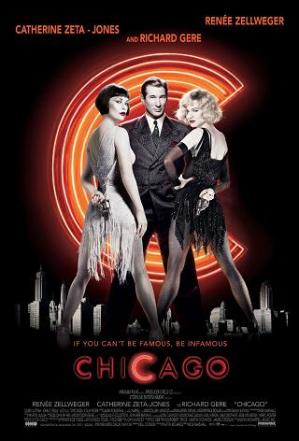 It’s strange to refer to a best picture winner as being underrated but that’s exactly the perfect description for the 2002 film Chicago.
It’s strange to refer to a best picture winner as being underrated but that’s exactly the perfect description for the 2002 film Chicago.
When Chicago was named the best picture of 2002, it was the first musical to take the top prize since The Sound of Music won in 1965. Until the box office success and Oscar triumph of Chicago, it was assumed by many that a musical had to be animated in order to be successful. After Chicago won, the conventional wisdom was changed. Dreamgirls, Nine, Rock of Ages, Hairspray, Jersey Boys, Into the Woods, Les Miserables, none of these films would have been produced if not for the success of Chicago. It’s also due to Chicago that television networks are willing to take chances on shows like Glee and Smash. And while I think a very valid argument could be made that we would all be better off without Glee, Smash, and Rock of Ages, you still can not deny that Chicago both challenged and changed the conventional wisdom.
https://twitter.com/Delanynder/status/606251356136042496
And yet, despite its success and its continuing influence, Chicago is one of those best picture winners that often seems to get dismissed online. Some of that’s because, by winning best picture, Chicago defeated not only The Two Towers (which is arguably the best installment in Peter Jackson’s Lord of the Rings trilogy) but also Roman Polanski’s searing masterpiece, The Pianist. Critics often point out that The Pianist won for best adapted screenplay, best actor, and best director but Chicago somehow managed to win best picture. They suggest that the Academy was either worried about the implications of giving best picture to a film directed by Roman Polanski or else they were blinded by Chicago‘s razzle dazzle. They argue that Chicago was merely an adaptation of an iconic stage production, whereas The Pianist and The Two Towers were both the result of visionary directors.
Well, to be honest, I think those critics do have a point. The Pianist is one of the most emotionally devastating films that I have ever seen. The Two Towers is the perfect mix of spectacle and emotion. And yet, with all that in mind, I still love Chicago.
And it’s not just because of scenes like this:
Or this:
Or even this scene of Richard Gere tap dancing:
If you’ve been reading this site for a while then you know my bias. You know that I grew up dancing. You know that I love to dance. And you know that I automatically love any film that features a dance number. And, since you know my bias, you may be thinking to yourself, “Well, of course Lisa likes this….” And you’re right.
But you know what? Even if nobody danced a step in this film, I would still enjoy it. (Though it would be odd to see a musical with absolutely no dancing.) Chicago is not just about spectacle. Instead, it tells a very interesting story, one that is probably even more relevant today than when the film was first released.
Set in 1924, Chicago tells the story of Roxie Hart (Renee Zellweger). Married to the decent but boring Amos (John C. Reilly), Roxie wants to be a star. She has an affair with slrazy Fred Casely (Dominic West), believing that he has showbiz connections. When Fred finally admits to her that he lied in order to sleep with her, Roxie reacts by murdering him. Because Roxie is pretty and blonde and claims to have been corrupted by the big, bad, decadent city, she becomes a celebrity even while she sits in jail and awaits trial.
Also in the jail is Velma Kelly (Catherine Zeta-Jones), a nightclub singer who killed her husband and sister. Roxie idolizes Velma but, after Velma snubs her, a rivalry forms between the two. Roxie hires Velma’s lawyer, the slick Billy Flynn (Richard Gere). During the trial, Roxie becomes even more popular, Velma grows jealous, and the only innocent women on death row — a Hungarian who can’t speak English — is ignored and executed because she doesn’t make for a good news story.
Chicago is a cynical and acerbic look at both the mad pursuit of celebrity and the pitfalls of the American justice system. In its way, it’s the film that predicted the Kardashians. (If Roxie had been born several decades later, it’s not difficult to imagine that she’d build her career off of a sex tape as opposed to murder.) Renee Zellweger and Catherine Zeta-Jones are both sociopathic marvels in their respective roles. Even Richard Gere, who, in other films, can come across as being oddly empty, is perfectly cast and surprisingly witty in the role of Billy.
Director Rob Marshall does a great job of making this stage adaptation feel truly cinematic. At no point does Chicago feel stagey. Perhaps Marshall’s smartest decision was to tell the entire film through Roxie’s eyes. Every musical lives and dies based on whether it can convince the audience that it would perfectly natural for everyone onscreen to suddenly break out into song. Chicago is convincing because, of course, Roxie would view her life as being a musical.
And did I mention that the film features a lot of great dancing?
Because it so seriously does….
So, yes, it can be argued that Chicago beat out some worthier films for the title of best picture of the year. But, regardless, it’s still a good and memorable film.